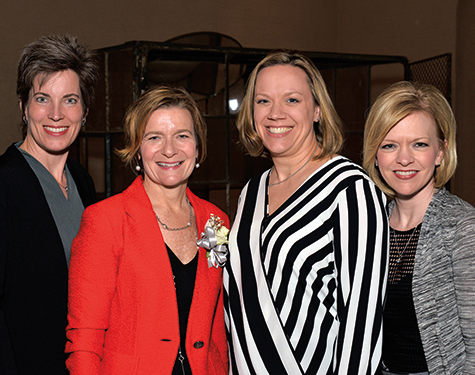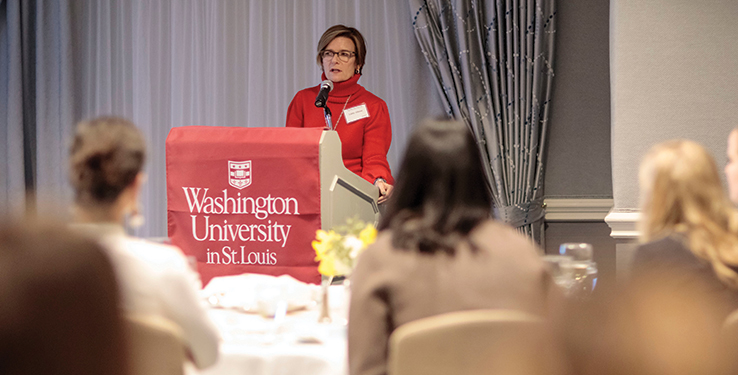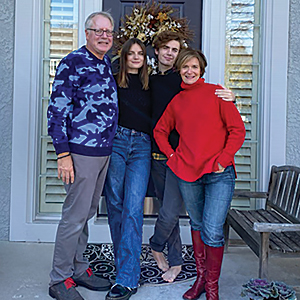In the cards
Libby Allman oversees manufacturing and global procurement for Hallmark Card Inc. which has faced new challenges since the COVID-19 outbreak
Libby Allman makes sure you find the perfect Hallmark card
By the time that the novel coronavirus was declared a national emergency in mid-March 2020, Libby Allman had already been dealing with its effects on her job for a few months.
Allman is vice president of manufacturing and global procurement at Hallmark Cards Inc., a $4.1 billion Kansas City, Missouri-based company with 30,000 employees worldwide, where she has worked for 20 years and where she is responsible for knowing when, where and how many cards and other products are made. She oversees manufacturing facilities in Lawrence and Leavenworth, Kansas, that make cards and wrapping paper, and partner suppliers in Asia that make other items, such as Keepsake Ornaments and gifts. Together with her peers on Hallmark’s distribution and logistics teams, she plans ahead to ensure that cards for everyday occasions and the three biggest card seasons — Valentine’s Day, Mother’s Day and Christmas — are ready and in stores in plenty of time. Hallmark sells its everyday and seasonal cards and products online and at retailers, chain drug and grocers, as well as at Hallmark Gold Crown stores, which carry exclusive cards and a larger selection of specialty items.
In early 2020, many companies with operations in China, including Hallmark, extended their employees’ time off for Chinese New Year as a result of the spread of coronavirus. Allman’s February trip to China was canceled, and about a month later, Hallmark closed its two Kansas plants for six weeks to comply with stay-at-home orders. For a company that makes seasonal and everyday products, the plant closures both in China and in Kansas ground its supply chain to a screeching halt.
“If you look at a graph of our volume output, we were going along, then there was a big dip, then gradually it goes back up again as we slowly brought employees back to work,” Allman said. “We sorted through the seasonal products we had in stages of production, and in time, completed all of it because we know we’ll need it next year, then worked to get through our everyday products. The Care & Concern and Sympathy categories were hard to keep up with, so we had to increase our units of those. We weren’t planning on that, so trying to get that through a plant that has an enormous amount of WIP (work in process) is really challenging.”
Hallmark brought its employees back to the plants in stages while screening, wearing face coverings and maintaining physical distancing, and is now working to catch up with its supply chain. In the meantime, the company donated nearly 6 million greeting cards worldwide to help people express their sentiments for others during the pandemic and manufactured and donated 10,000 face shields to the State of Missouri to distribute to health care organizations and schools.
Allman has had several roles at Hallmark, including vice president of product integrity and technical resources for which she was responsible for brand protection; vice president of supply chain planning & product integrity; general manager of the Hallmark Distribution Center; and director of process and program management in information technology. She also co-founded the Hallmark Women’s Network.

Allman (second from left) with colleagues from Hallmark
Prior to joining Hallmark, she was a management consultant for Grant Thornton LLP and a process improvement manager for Fike Corp., where she worked while earning an MBA from Rockhurst University.
Allman credits WashU’s Dual Degree program, from which she earned a bachelor’s in mechanical engineering in 1991 and a bachelor’s degree in physics from William Jewell College in 1990, for preparing her for all of these challenges.
“I still love the fact that I did that program — I talk it up all the time,” she said. “The liberal arts part of it was deep on communication, critical thinking and problem solving. For someone like me — I’ve never thought of myself as an engineer’s engineer — it was wonderful because I could take subjects like Spanish for four years or a religion or literature class.
“All of that plus the engineering really broadened my mind and introduced me to things that I didn’t necessarily know about. For me, that was really important to making me a whole-brain thinker.”
The role of women in engineering also is important to Allman. She is a mentor in the McKelvey School of Engineering’s Women & Engineering program, on the board of directors of the Society of Women Engineers, and an advocate for recruiting more women into the areas of engineering in which they are underrepresented — and keeping them there.

Allman speaking at the Women & Engineering Leadership Summit in 2018
“These young women are extraordinary in high school and are the best in their class,” she said. “But when they get to college and take their first engineering class, they may get their first D or F in their lives and think they aren’t smart enough to handle engineering and change to something else. We have to make sure these women understand that you don’t have to make straight As in engineering to be a good engineer.”
Second, she says, women want to be involved in other activities, such as sports, sororities or volunteer work.
“WashU has always been open to a new way of thinking about that, and that’s one of the keys to getting more women in engineering,” she said. “That, plus having more women professors and being part of women’s engineering organizations so they can see other women who have developed the tenacity to stick with engineering and see that women can have families and work in engineering fields, and also so they have a place to talk about issues that impact them as women that maybe don’t impact men.”
She advocates for those in Kansas City, as well, where she is on the board of directors of the Urban Neighborhood Initiative, an organization that works with neighborhoods to break the cycle of poverty and build healthy neighborhoods. She also leads Hallmark Cards’ political action committee, known as HallPAC, which works with local politicians to advocate for issues that impact Hallmark, such as continuing six-day postal service, and she is a longtime board member of and volunteer with the Girl Scouts of Northeast Kansas and Northwest Missouri.

In addition to her community involvement, she remains involved with the McKelvey School of Engineering as well. Allman received an Alumni Achievement Award from the school in 2017 and joined the school’s National Council the same year. She is co-chair of the WashU-Kansas City Regional Cabinet. Allman and Scott Ruland also support the Allman & Ruland Scholarship in Engineering
“I am so incredibly honored and humbled by the people in that room,” she said. “I am a phenomenal advocate for WashU, so the more information I have about what’s happening on campus and in engineering, the more I can advocate for it.”
Editor’s note: After this story went into production, Libby Allman left Hallmark for another opportunity.
Back to Engineering Momentum
